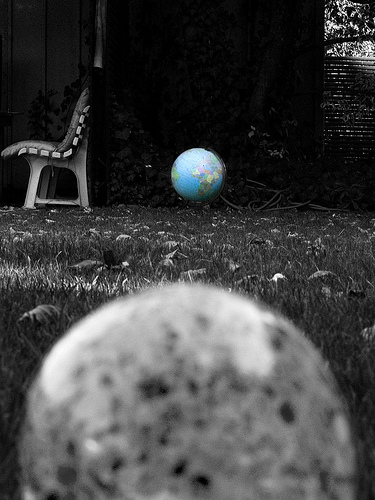We Are What We Measure
March 18, 2010 Leave a comment
|Photo by MontyPython|http://www.flickr.com/photos/montypython/3853109452/|
Last week a few of us here at IISC had the privilege of reconnecting with Peter Forbes and Ginny McGinn of the Center for Whole Communities. The focus of our two day summit was the development of a training to help people implement Whole Measures, CWC’s holistic framework for thinking about social, community, and organizational change. Rooted in narrative, Whole Measures has its own interesting story.
Years ago, while conducting research for a land conservation organization, Peter happened upon an eden in a previously vacant lot in a low income neighborhood in New York City. The efforts of a remarkable woman had transformed this space into a place of peace, abundance, and healing. Community members came together across generations to tend to the earth, relax in the shade, listen to birds, and enjoy the bounty of the garden.
Moved by this discovery, Peter set off to make the case that his organization should invest millions of dollars in a few acres of land in the inner city over putting funds towards hundreds of acres elsewhere. His cause was not helped by the fact that his organization measured success exclusively in terms of “acres preserved and dollars raised.” There was nothing in their lexicon about civic engagement or community building. This lit a fire under Peter, resulting in both a successful campaign to convince his employer to invest in NYC (which helped nurture an urban garden movement) and later the creation of Whole Measures, to help leaders, organizations, and community members understand that one dimensional assessments of their efforts often miss the real nature of the problems they are trying to solve.
You get what you measure. What you pay attention to grows, perhaps at the expense of someone or something else. If we define individual success only in terms of income, this can come at the expense of the things that truly make us happy (relationships, meaningful work). If our collective sights are set solely on land protection, this may be at the expense of people who lack connection to the land and other resources. If we only pay attention to human welfare and economic development, we may risk undercutting the natural ecosystems that are our life support.
Something that was reinforced in our discussion with CWC is that evaluation coming from a linear/complicated worldview does not fit quantum/complex realities. We have to see differently, be differently, and do differently going forward. This includes how we define and determine success. How does what we measure fit the bigger story we want to tell about our efforts? Are our measures coherent with of our deepest and shared values?
Please tell us your stories, and stay tuned for the Whole Measures training . . .
No Comments
As an addendum, this just came across my screen – conversations about evaluation and complexity are heating up http://aidontheedge.info/2010/02/09/monitoring-and-evaluating-complex-development-mokoro-seminar-series/
Ok, once again Curtis your post is filled with synergystic timing for my work. I was just taling about sharing an article for some group learning exercise around getting out of our “status quo” thinking and wanted to share some work around “wicked problems”…but this article is a great foundation to start with. Thanks so much for continually sharing your learnings.
Talitha
Great to hear, Talitha. We are in synch!
Great post Curtis. Is the subhead maybe “things grow where you plant the seed and tend the garden”? As muh as being about measuring, this sounds like it’s about where you focus. Is that right?
Linda, I think you are right. It’s primarily about focus. In discussing Whole Measures, we realized that calling it an evaluation tool really misses the mark. It is essentially a values-based framework for directing our attention to what matters. This then guides our choice of processes and actions and then how (and where) we assess progress. To your metaphor, it is indeed about planting the seed and remembering that it isn’t just about the seed. It is about a garden SYSTEM. If we pay attention to those other garden elements from the get go (not just soil and water, but other plants and how our seed might interact with those- a la Permaculture) then we are likely to see a more diverse bounty and healthy system.
Great Curtis! And then, to continue the metaphor, there’s also the compost – attending to and turning the things that didn’t work into food for growth – continual learning and re-using/recycling that knowledge.
Exactly! I like that Linda, especially on the heels of a conversation with someone yesterday about systems thinking. It is not about finding a silver bullet, but seeing the system, testing out interventions, learning from and making use of “failure” to learn more about the truth of the system and other possible interventions. Dance, dance, dance . . .
If you want to know more about UNDP and discuss relevant topic about social development, just go to this website: http://www.ideas4development.org/
The blog brings together a set of senior professionals engaged in this sphere through their careers and personal convictions. This Blog aims at offering a new forum for open discussion and interaction between scholars, students, professionals of various backgrounds and the public at large.